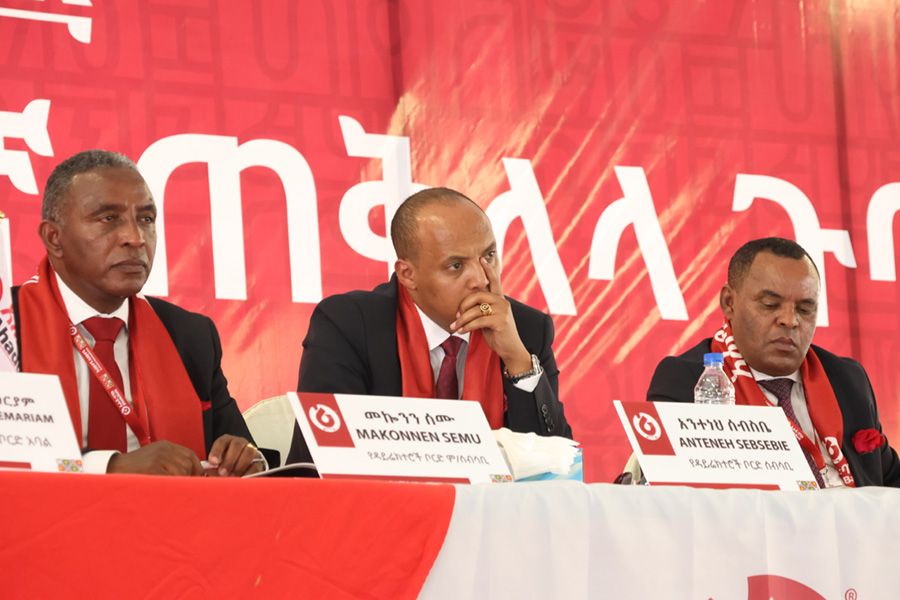
Radar | May 14,2022
Oct 23 , 2018
By FASIKA TADESSE ( FORTUNE STAFF WRITER )
The central bank has remitted 40.1 million Br in fines it levied on seven banks that failed to invest two percent of their expenses on staff training.
In a letter issued on November 27, 2018, Solomon Desta, director of banking supervision at the National Bank of Ethiopia, notified the banks of the remit, but ordered the banks to use the returned fines in their current fiscal year's budget for staff training.
The National Bank compelled all bank and financial institutions to spend two percent of their expenses, excluding capital expenditures, on human resource development two years ago. While issuing the requirements, the central bank stated that the guideline came into effect with the primary aim of reducing employee poaching in the industry, which had become severe among banks, and to enable the industry to have a capable and competent workforce.
However, last October the central bank issued a letter to the Ethiopian Bankers Association stating that seven banks, including the state policy bank, the Development Bank of Ethiopia, have failed to invest the required amount on staff and board of directors training. The letter also stated that the levied sum, valued at 40.1 million Br, should be used by all of the 18 member banks in the country for staff training.
The letter also requested that the Association report a bank account where the fine will be deposited before October 30, 2018. Additionally, the Association was also asked to craft a training manual for all of its member banks financed by the penalty.
The lion’s share of the levy fell on Dashen, which compelled to pay 11.8 million Br; Abay, 10.9 million Br; Nib, 6.89 million Br; and Berhan Bank, 4.85 million Br.
In addition, Development Bank of Ethiopia was ordered to settle for 4.39 million Br; Bunna, 1.31 million Br; and Cooperative Bank of Oromia paid 420,000 Br in fines for failing to invest in human capital development at their respective banks.
Following the central bank's letter, the Association held a meeting with the seven banks. During the meeting, the representatives of the banks put forward two proposals to resolve the issue. Relieving the banks from the payment or investing the money in their staff in the current fiscal year.
A three-member committee was formed by the Association to assess all the possibilities and to table the findings and recommendations to the board of the Association for approval.
Following the recommendations, the banks held a meeting with the Association on November 1, 2018, and agreed to use the money in this fiscal year and add it to the current year's budget.
“The banks should fully use this money in training both their board members and employees,” reads Solomon’s letter, that was issued at the end of last month.
Last year, the industry invested 629 million Br to train their 140,464 employees, of which 7,860 of them are new employees.
Though the seven banks were said to have failed to invest the appropriate amount in developing their human resources, three other banks invested above the required amount in training their staff and board members. Commercial Bank of Ethiopia spent 271 million Br; Lion, 18.3 million Br; and Wegagen invested 11.16 million Br, all above the mandated limit for training.
A human resource development expert believes banks should be cautious in their talent development.
The banks have to invest in their human resource advancement, without being reminded by the regulatory bank, according to Gemechu Waktola (PhD), managing director of iCapital Institute and a lecturer at Addis Abeba University, College of Business & Economics.
PUBLISHED ON
Oct 23,2018 [ VOL
19 , NO
969]

Radar | May 14,2022

Radar | Jul 21,2024

Fortune News | Apr 10,2023

Fortune News | Dec 27,2018

Radar | Aug 26,2023

Radar | Nov 20,2023

Fortune News | Aug 24,2019

Radar | Nov 16,2019

Radar | Feb 17,2024

News Analysis | Nov 24,2024

Dec 22 , 2024 . By TIZITA SHEWAFERAW
Charged with transforming colossal state-owned enterprises into modern and competitiv...

Aug 18 , 2024 . By AKSAH ITALO
Although predictable Yonas Zerihun's job in the ride-hailing service is not immune to...

Jul 28 , 2024 . By TIZITA SHEWAFERAW
Unhabitual, perhaps too many, Samuel Gebreyohannes, 38, used to occasionally enjoy a couple of beers at breakfast. However, he recently swit...

Jul 13 , 2024 . By AKSAH ITALO
Investors who rely on tractors, trucks, and field vehicles for commuting, transporting commodities, and f...

Nov 1 , 2025
The National Bank of Ethiopia (NBE) issued a statement two weeks ago that appeared to...

Oct 25 , 2025
The regulatory machinery is on overdrive. In only two years, no fewer than 35 new pro...

Oct 18 , 2025
The political establishment, notably the ruling party and its top brass, has become p...

Oct 11 , 2025
Ladislas Farago, a roving Associated Press (AP) correspondent, arrived in Ethiopia in...